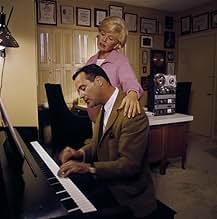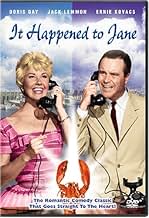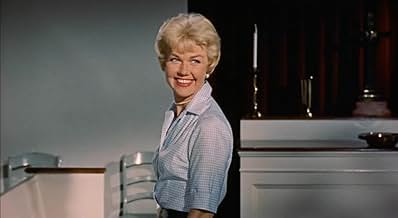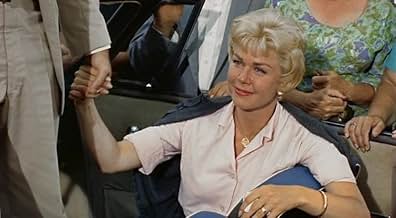IMDb RATING
6.5/10
3.3K
YOUR RATING
Jane Osgood runs a lobster business, which supports her two young children. Railroad staff inattention ruins her shipment, so with her lawyer George, Jane sues Harry Foster Malone, director ... Read allJane Osgood runs a lobster business, which supports her two young children. Railroad staff inattention ruins her shipment, so with her lawyer George, Jane sues Harry Foster Malone, director of the line and the "meanest man in the world".Jane Osgood runs a lobster business, which supports her two young children. Railroad staff inattention ruins her shipment, so with her lawyer George, Jane sues Harry Foster Malone, director of the line and the "meanest man in the world".
Max Showalter
- Selwyn Harris
- (as Casey Adams)
Robert Paige
- Bob Paige - Host 'The Big Payoff'
- (as Bob Paige)
Featured reviews
It Happened to Jane presents Doris Day as a woman on a mission. She's inherited a lobster business from her late husband and due to some cost cutting on the railroad that President Ernie Kovacs has put through, her lobsters were dead on arrival at their destination.
I'd be burned up as well and Doris and lawyer Jack Lemmon sue the railroad. They win a nominal sum, but that ain't good enough. They both carry on the fight and she becomes a media star. Kind of like a Fifties version of Erin Brockovich.
Of course all of this is done at the incredible stupidity and abominable sense of public relations that Ernie Kovacs has. His character is yet another version of Al Capp's General Bullmoose. And that character was a satire on Eisenhower's first Defense Secretary Charles E. Wilson. Wilson at his confirmation hearings uttered that never to be forgotten phrase that he had always operated on the principle that what was good for General Motors was good for the USA. Wilson was a fatuous sort of gent, just like Ernie Kovacs here. I'd have to say Kovacs was having a whale of a good time in this part.
The movie had some nice location shooting which definitely helped. And I completely agree with the previous reviewer who said that Lemmon and Day meshed nicely together as a team. It is a pity they weren't ever teamed again.
A favorite character part in the film for me is Russ Brown who plays Day's uncle and a former railroad engineer, a fact that comes in handy during the climax of the film.
It's a nice family film, but it also gets in a few good satirical shots at American business types.
I'd be burned up as well and Doris and lawyer Jack Lemmon sue the railroad. They win a nominal sum, but that ain't good enough. They both carry on the fight and she becomes a media star. Kind of like a Fifties version of Erin Brockovich.
Of course all of this is done at the incredible stupidity and abominable sense of public relations that Ernie Kovacs has. His character is yet another version of Al Capp's General Bullmoose. And that character was a satire on Eisenhower's first Defense Secretary Charles E. Wilson. Wilson at his confirmation hearings uttered that never to be forgotten phrase that he had always operated on the principle that what was good for General Motors was good for the USA. Wilson was a fatuous sort of gent, just like Ernie Kovacs here. I'd have to say Kovacs was having a whale of a good time in this part.
The movie had some nice location shooting which definitely helped. And I completely agree with the previous reviewer who said that Lemmon and Day meshed nicely together as a team. It is a pity they weren't ever teamed again.
A favorite character part in the film for me is Russ Brown who plays Day's uncle and a former railroad engineer, a fact that comes in handy during the climax of the film.
It's a nice family film, but it also gets in a few good satirical shots at American business types.
for discover the entire force of film , it is not a bad idea to see it twice. first time for its adorable cast and extraordinary humor. than, for the message. it is more than an old film and it is more than a comedy. it has a splendid charm but the fight between a young widow, the role of media for case, the great corporation against the simple people are more great challenges for 2015 than for 1959. another aspect - Doris Day's acting who could be, after too many easy roles, a surprise. Jack Lemmon is himself and the dose of romanticism is perfect for admire a film who use all its potential. a remarkable comedy. and one of the splendid roles by Doris Day.
Having expected a run-of-the-mill comedy effort I was surprised to be drawn into this unusually well-written, -acted, and -produced effort. The story avoided dropping to the "cutesy" level; there was enough grit in the conflict between Jane and the railroad magnate to keep one involved. I can only echo the plaudits given by others in this space to the efforts of Day, Lemmon and, especially, the underrated Ernie Kovacs. I echo the criticism of the brief flash of gratuitous partisanship in Lemmon's little speech about the stingy, nasty Republican running for selectman, but it's a minor flaw. A nice plus is the rich look of the movie, with its portrayal of the New England countryside and its nice footage of the venerable steam locomotive, a form of transport sadly passing from the scene when the flick was made. (The color technology of films from this period is superior to what we have nowadays). All in all, a delightful surprise, and well worth catching.
This has to be the most underrated and overlooked of the comedies from Doris Day's later career. I'm surprised at the relatively low score it has received here on IMDb, as it's a really fun and entertaining movie (particularly following the unfortunate Tunnel of Love she appeared in the prior year).
Rather than the lush, opulent interiors and wardrobe we usually look forward to in a Day comedy, this one is stunning for its exteriors. Filmed in New England in the summer of 1958, the film exudes idyllic small town splendor. Day plays Jane Osgood, a widowed entrepreneur (all "independent" women in 1950's TV or movies are either widows, as in Lucille Ball's later television work, or impossible-to-marry shrews like Joan Crawford in The Best of Everything). Osgood operates a budding lobster business, and when an expensive shipment is ruined by the laxity of the railroad, she takes on railroad magnet Harry Foster Malone in a highly publicized David & Goliath lawsuit. Ernie Kovacs is particularly memorable in his portrayal of Harry Foster Malone, an obvious and amusing allusion to Orson Welles' Charles Foster Kane, which was of course an allusion to William Randolph Hurst. In her legal battle, Osgood enlists the aid of local attorney and old friend George Denham, the man she's "supposed" to be with and just doesn't realize it, played well by a young Jack Lemmon. Throughout the course of the story, the film seems to at regular intervals inject some rather insightful observations on a multitude of thought-provoking topics, including the place and nature of democracy in a capitalist society, the overwhelming power wielded by big business, even the (at the time) ever expanding place of television in our lives and its ability to influence and inform. And all of this in a comedy!
The only negative I can think of is the inclusion of perhaps the worst musical number ever put on film. Jane Osgood is the den mother of the local boy-scout troop (naturally) and at the camp out in her back yard she leads them in a sing-a-long of the single most stupid, dreadful and endless song you ever heard in your life. "Be Prepared" well they warned you! It starts out as amusingly bad, but then seems to last about fifteen or twenty minutes until you think you'd rather take your own life than hear one more note. Any self-respecting boy scout over the age of five would kick you right in the nuts if you asked him to sing this wretched torturous piece of nonsense.
This aside (it is unfortunately not that uncommon in films of this era), this film benefits well from a strong, well written script and an excellent cast. It is actually much more intelligent and heart-warming than any of the Doris Day-Rock Hudson pairings, and while it is a very different kind of film, it can hold its own against any of those. Highly recommended, but be prepared to hit the "mute" button when those boy-scouts start singing!
Rather than the lush, opulent interiors and wardrobe we usually look forward to in a Day comedy, this one is stunning for its exteriors. Filmed in New England in the summer of 1958, the film exudes idyllic small town splendor. Day plays Jane Osgood, a widowed entrepreneur (all "independent" women in 1950's TV or movies are either widows, as in Lucille Ball's later television work, or impossible-to-marry shrews like Joan Crawford in The Best of Everything). Osgood operates a budding lobster business, and when an expensive shipment is ruined by the laxity of the railroad, she takes on railroad magnet Harry Foster Malone in a highly publicized David & Goliath lawsuit. Ernie Kovacs is particularly memorable in his portrayal of Harry Foster Malone, an obvious and amusing allusion to Orson Welles' Charles Foster Kane, which was of course an allusion to William Randolph Hurst. In her legal battle, Osgood enlists the aid of local attorney and old friend George Denham, the man she's "supposed" to be with and just doesn't realize it, played well by a young Jack Lemmon. Throughout the course of the story, the film seems to at regular intervals inject some rather insightful observations on a multitude of thought-provoking topics, including the place and nature of democracy in a capitalist society, the overwhelming power wielded by big business, even the (at the time) ever expanding place of television in our lives and its ability to influence and inform. And all of this in a comedy!
The only negative I can think of is the inclusion of perhaps the worst musical number ever put on film. Jane Osgood is the den mother of the local boy-scout troop (naturally) and at the camp out in her back yard she leads them in a sing-a-long of the single most stupid, dreadful and endless song you ever heard in your life. "Be Prepared" well they warned you! It starts out as amusingly bad, but then seems to last about fifteen or twenty minutes until you think you'd rather take your own life than hear one more note. Any self-respecting boy scout over the age of five would kick you right in the nuts if you asked him to sing this wretched torturous piece of nonsense.
This aside (it is unfortunately not that uncommon in films of this era), this film benefits well from a strong, well written script and an excellent cast. It is actually much more intelligent and heart-warming than any of the Doris Day-Rock Hudson pairings, and while it is a very different kind of film, it can hold its own against any of those. Highly recommended, but be prepared to hit the "mute" button when those boy-scouts start singing!
10sobaok
After watching this film several times -- one wonders why the natural talents of Doris Day and Jack Lemmon weren't paired more often. Their totally believable portrayals really hold the viewer -- one can't overlook the fact that these two were at the top when it came to natural talent on the screen. Day's fight with railroad magnate (Ernie Kovaks fits his role like an old shoe) brings to the fore "corporate/community greed" vs. "human rights" as the townfolk and eventually the "nation" get behind Doris' quest to save her lobster business in Maine. The humor is mixed with some thought-provoking questions. In 2001, the film is almost a glimpse at the last vestage of the "town hall meeting" government. The supporting cast is fine (Mary Wickes, in particular adds great comic touch) -- but it's Day and Lemmon together that make this film a must see.
Did you know
- TriviaJack Lemmon wrote that he thought this was a good, funny movie that didn't do well because of its "terrible title". He thought he and Doris Day had very good chemistry together, and he regretted that they never did another film.
- GoofsWhile the story supposedly takes place in Maine, in a railroad scene the Connecticut State Capitol can be seen in the background.
- Quotes
Jane Osgood: Gentlemen, I will not take the money.
- ConnectionsFeatured in AFI Life Achievement Award: A Tribute to Jack Lemmon (1988)
- How long is It Happened to Jane?Powered by Alexa
Details
- Release date
- Country of origin
- Language
- Also known as
- La indómita y el millonario
- Filming locations
- Plainfield, Connecticut, USA(exterior scenes)
- Production company
- See more company credits at IMDbPro
- Runtime1 hour 37 minutes
- Aspect ratio
- 1.85 : 1
Contribute to this page
Suggest an edit or add missing content







































